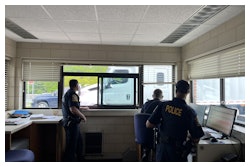Department of Transportation Secretary Sean Duffy on Tuesday announced the official end of the Obama-era relaxation of enforcement of English language proficiency (ELP) regulations and gave an update on the review of CDLs for foreign drivers at an event in Texas.
The text of the new Federal Motor Carrier Safety Administration enforcement policy on English language proficiency can be found here.
Duffy stood with Owner-Operator Independent Drivers Association President Todd Spencer as well as leaders of the Texas DOT and Texas Trucking Association to deliver a speech in which he praised truck drivers as the "backbone" of the country.
"For too long misguided policies prioritized political correctness over safety of the American people," said Duffy. "President Trump puts safety first and American first," he said referencing Trump's April executive order around ELP enforcement and related issues.
Duffy said the event was intended to make a "clear statement that we support America’s truckers and will safeguard our roadways for truckers and the American people" by "removing unnecessary rules" and officially rescinding the "reckless 2016 guidance on English language proficiency" to "replace it with stronger procedures."

At the event, Duffy signed a secretarial order instructing the FMCSA to issue guidance restoring ELP to the out-of-service criteria.
The Commercial Vehicle Safety Alliance, which voted to remove ELP from the OOS criteria in 2014, took the emergency action of quickly restoring ELP to the OOS criteria in the days following President Trump's order.
"English is the language of opportunity in America," said Duffy. "Allowing drivers who cannot read stop signs or listen to police instructions to operate 80,000-pound big rigs" he called "a threat to Americans." He added there are "numerous examples" of how allowing drivers who can't understand English has "been devastating and taken the lives of so many American families."
"That’s going to end right now," Duffy concluded. As of last week's Roadcheck event, states still were not enforcing ELP as an OOS violation -- CVSA gave Overdrive a June 25 date for ELP's official inclusion in the OOS criteria -- but the secretarial order sought to speed up the process.
Duffy cited 2014 FMCSA data, which showed nearly 100,000 ELP violations were recorded with about 1,000 considered OOS. He compared that to more recent years that saw around 10,000 violations and zero taken OOS.
"Think about that, we have let 1,000 of the worst offenders off the hook with a slap on the wrist," said Duffy. "That's not going to happen anymore."
[Related: Could Trump's English language proficiency mandate sideline 100,000 drivers]
Some freight analysts have predicted that strict ELP enforcement could boost spot rates as much as 15%.
Duffy said the DOT would be "taking additional action" by "reviewing the security of CDLs," which he acknowledge was a "state by state issue," but one in which the DOT plays a role. Duffy pledged to "review non-domiciled CDLS" in an effort to "ensure there are only qualified drivers on American roads."
Overdrive has investigated state issuance of non-domiciled CDLs and found tens of thousands issued from a handful of states, as well as the fact that California doesn't even track the issuance of CDLs to non-citizens.
Duffy described truck drivers as "one of the most vocal groups of people."
"When they have an issue they know how to use Twitter, they know how to use all forms of social media, and we've heard from them that quality of life can be improved" by "looking at critical needs like truck parking, which impacts the lives of truckers on the road." Duffy promised "more to come" on that front.
"From not enforcing ELP to broker fraud to non-domiciled CDLs, it kind of feels like the trucking industry has become the wild wild west with a lot of bad actors allowed to play in this space," he said, vowing to "support and encourage and prop up the great industry, the great drivers, and the great brokers that hold this industry up."
OOIDA President Todd Spencer thanked Duffy and Trump "for taking bold action to put highway safety first by signing the Executive Order that restores English language proficiency as a core safety requirement for commercial drivers."
Spencer agreed with Duffy and Trump's "commonsense" characterization of the effort and gave some detail on how ELP might get enforced.
"Complying with the language proficiency standards doesn’t mean you can recite an encyclopedia, but it should mean you comprehend routine safety messages," said Spencer. "Those can and should be taught in training schools and tested for. English proficiency isn’t optional. It’s essential."
Spencer took the moment to call for better training standards, too: "Unfortunately, there are far too many unqualified drivers being licensed and operating on the road today. Inadequate training combined with loopholes in state testing protocols result in drivers who lack the basic skills necessary to safely operate a commercial truck. These insufficient standards are failing new drivers when they encounter unfamiliar conditions, scenarios, and other challenges that weren’t included in initial testing and training environments."
Both Spencer and Duffy called the day's announcements a step in the right direction and promised more to come.
[Related: Hours of service should be front and center in Trump deregulatory efforts]











